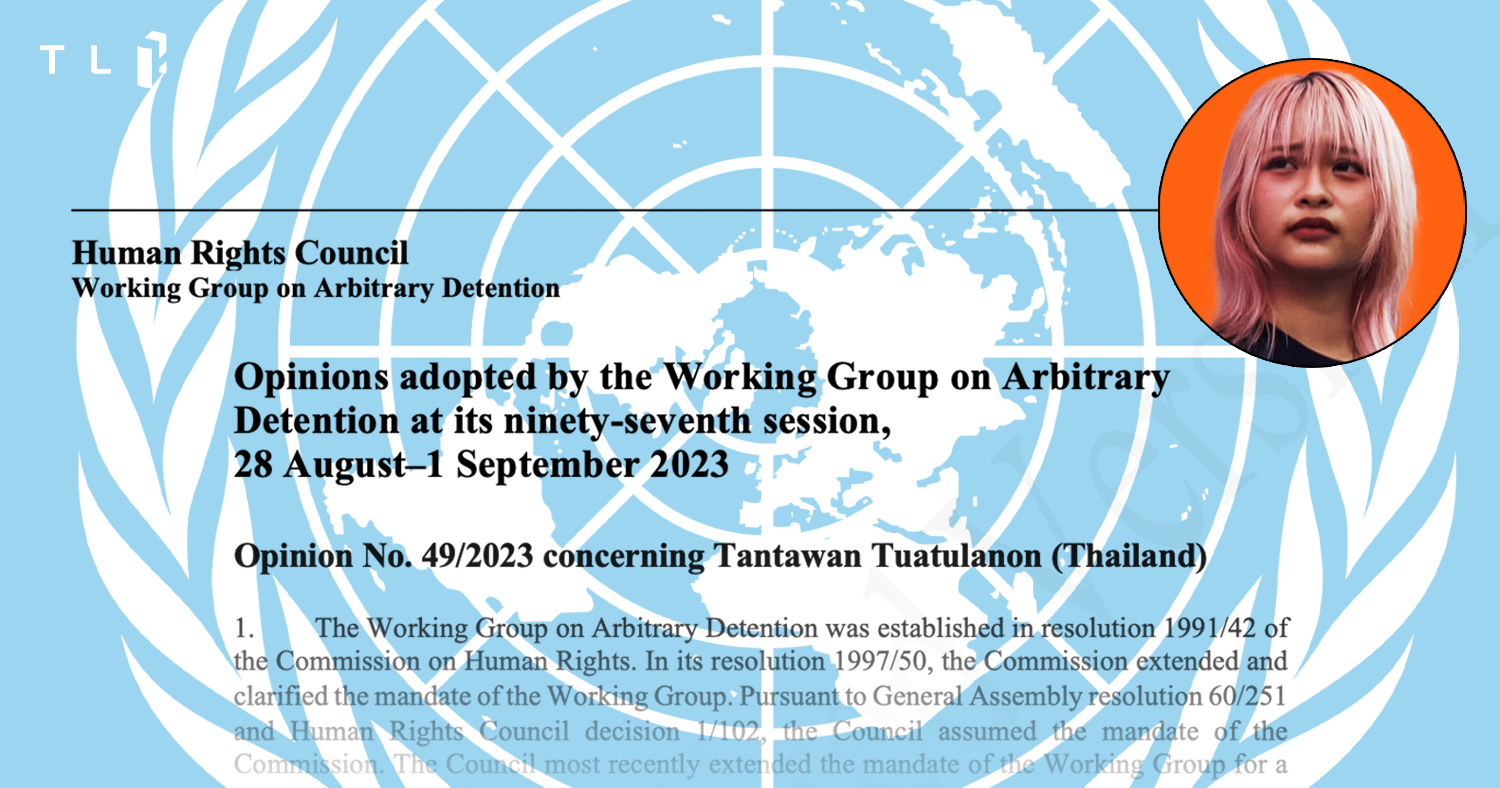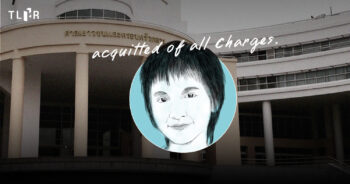The United Nations Working Group on Arbitrary Detention (Working Group), a special mechanism under the UN Human Rights Council, has published its opinion on 23 October 2023 (A/HRC/WGAD/2023/49) regarding the case of “ Tawan” Tantawan Tuatulanon, a 21-year-old student and activist who was prosecuted under Section 112 for defamation of the King.
The Working Group ultimately determined that Tawan’s detention is considered arbitrary under international law in three categories. Firstly, the Working Group found the deprivation of Tawan’s liberty arbitrary under Category I on the grounds that there was no legal basis for Tawan’s detention. The Working Group recalled its jurisprudence finding that the vague and overly broad offense Tawan was charged for, namely Section 112 of the Thai Criminal Code, expressly violates international human rights law and therefore has no legal basis. Second, the Working Group found the deprivation of Tawan’s liberty arbitrary under Category II on the grounds that it violates article 19 of the Universal Declaration of Human Rights and article 19 of the International Covenant on Civil and Political Rights. The Working Group reiterated that deprivation of Tawan’s liberty on the grounds of “insulting the King” under Section 112 is a violation of Tawan’s right to freedom of expression. Third, the Working Group found the deprivation of Tawan’s liberty to have an arbitrary character on the grounds that Tawan’s rights to a fair trial and due process were violated. The Working Group affirmed that Tawan’s trial, which was scheduled more than a year and a half after her arrest, was not held within a reasonable time and without undue delay.
On 6 February 2023, with the consent of Tawan, Thai Lawyers for Human Rights submitted an urgent appeal to the UN Working Group on Arbitrary Detention on behalf of Tawan and “Bam” Orawan, both of whom applied to revoke their own bail on 16 January 2023.
On 9 May 2023, the Working Group sent a letter communicating the aforementioned allegations to the Thai government. The Working Group requested that by 10 July 2023, the government provide detailed information regarding Tawan’s current situation, in addition to reasonable legal provisions justifying Tawan’s detention and the detention’s compatibility with international human rights law. The Working Group also called on the government to ensure that Tawan be cared for, both physically and mentally. However, the Thai government did not respond to the Working Group’s letter nor request an extension of the time limit for its reply.
The three categories that the Working Group determined Tawan’s detention arbitrary are summarized as follows:
Category I : Tawan’s arrest under Section 112 has no legal basis and therefore her detention is arbitrary.
On 5 March, 2022, Tawan was arrested without an arrest warrant for live-streaming the route of a royal motorcade. The Working Group reiterated that in the event of an arrest, authorities must invoke legal basis and apply it to the circumstances of the case at hand, typically done by issuing an arrest warrant or an arrest order. Any arrests and detentions without adequate legal basis (i.e., without an arrest warrant or a clear application of a law to the case) constitute arbitrary detention. The Working Group determined that Tawan’s detention was not ordered by a relevant judicial or other authority with guarantees of competence, impartiality, and independence, a violation of Articles 3 and 9 of the Universal Declaration of Human Rights, as well as Article 9(1) of the International Covenant on Civil and Political Rights.
Although Tawan was released on bail on 27 May 2022, Tawan’s bail conditions imposed by the Court constituted house arrest. Tawan was not allowed to leave her residence unless a detailed motion was filed with the Court and approved, was required to wear an electronic tracking device at all times, and was prohibited from leaving the country. The Working Group determined that Tawan’s confinement in such closed premises was tantamount to the deprivation of Tawan’s liberty.
The Working Group also considered whether Section 112 of the Thai Criminal Code is in accordance with international standards. Notably, the Working Group recognized that Section 112 does not specify the types of expression considered defamatory, insulting, or threatening to the monarchy and leaves the determination of whether an act is a violation of the law completely to the discretion of the authorities. Citing previous Working Group communications as well as Human Rights Committee concerns during Thailand’s periodic reviews, the Working Group recalled that Section 112 is vague and overly broad, and is incompatible with the right to freedom of expression. Because Tawan was detained under legislation that violates international human rights law, namely Article 11(2) of the Universal Declaration of Human Rights and Article 15(1) of the International Covenant on Civil and Political Rights, the Working Group determined that there was no legal basis for depriving Tawan of her liberty and therefore her detention was arbitrary.
Category II: Section 112 is a violation of freedom of expression and therefore Tawan’s detention on the basis of this law is arbitrary.
The Working Group determined that Tawan’s live-stream and posts of the route of the royal motorcade falls within the scope of exercising her right to freedom of expression protected under Article 19 of the Universal Declaration of Human Rights and Article 19 of the International Covenant on Civil and Political Rights. The Working Group clarified that even speech that may insult or criticize a public figure is protected under the right to freedom of expression and therefore is not sufficient grounds to impose punishment. Further, the Working Group reiterated that the rule of law should not provide harsher punishments simply because of a person’s status or identity, even if the criticism is directed towards the highest political authorities such as Heads of State.
Article 19 (3) of the International Covenant on Civil and Political Rights Restrictions on freedom of expression explicitly specifies that any restriction on the freedom of expression must 1) be enshrined in law to achieve the legitimate aims of protecting national security, public order, public health, or morals; 2) be imposed with the requirement of necessity; and 3) be imposed with the requirement of proportionality.
The Working Group determined that the Thai government did not invoke any of the legitimate aims and additionally failed to demonstrate that the arrest, detention, and prosecution of Tawan was a necessary and proportionate response to her peaceful actions. In particular, the Working Group noted their grave concern for the disproportionate sentence of imprisonment imposed upon Tawan for exercising her fundamental right to freedom of expression and peaceful assembly, especially since it was implausible that her actions could have incited violence or threatened the the rights or reputations of others, national security, public order, public health or morals. As a result, the Working Group determined that the deprivation of Tawan’s liberty on the basis of Section 112 is a violation of Tawan’s rights to freedom of expression and therefore her detention was arbitrary. The Working Group also noted that it will forward Tawan’s case to the Special Rapporteur on the promotion and protection to freedom of opinion and expression for additional action.
Category III : Tawan’s right to a trial within a reasonable time and without undue delay was violated and therefore her detention is arbitrary in character.
Articles 9 (3) and 14 (3)(c) of the International Covenant on Civil and Political Rights require that persons arrested or detained on criminal charges have the right to a trial within a reasonable time and without delay longer than necessary. Because Tawan’s detention was the result of the peaceful exercise of her fundamental right to freedom of expression, the Working Group determined that any delay in trying her case was unreasonable.
Although Tawan has been released pending trial and therefore is not legally considered detained, the Thai government still has an obligation to hold a trial within a reasonable time. The Working Group noted that the prosecution engaged in actions that have caused unnecessary delays to the trial, including not responding to requests from defense lawyers. As a result, Tawan’s trial was scheduled more than a year and a half after her arrest, which the Working Group found to be unacceptably long and a violation of Articles 9(3) and 14(3)(c) of the International Covenant on Civil and Political Rights. In light of the violations of Tawan’s due process rights, namely Tawan’s right to a trial held within a reasonable time and without undue delay, the Working Group determined Tawan’s detention to have an arbitrary character.
Despite the delays throughout Tawan’s case, the Working Group requested in its “Disposition” that the Thai government take necessary actions to resolve Tawan’s situation without delay in accordance with relevant international human rights obligations. The Working Group also requested that the Thai government provide information on actions taken in regards to the release of Tawan and compensation for her previous detentions; an investigation into the deprivation of Tawan’s fundamental rights; and the revision of domestic legislation not in line with Thailand’s international obligations.
The UN Special Mechanism expressed concern for the Thai government’s continued prosecution and enforcement of Section 112.
For more than a decade, UN monitoring mechanisms have raised concerns about the prosecution and enforcement of Section 112 and have repeatedly called for its immediate amendment or repeal. Special procedure mandate holders have explicitly established that Section 112 is incompatible with Article 19 of the International Covenant on Civil and Political Rights and is systematically used to restrict freedom of expression in Thailand.
The opinion of the UN Working Group on Arbitrary Detention regarding the case of Tawan (A/HRC/WGAD/2023/49) is not the first time the Working Group has expressed its concerns for arbitrary detention in Thailand. Since August 2012, the Working Group has determined that the detention of 10 people under Section 112 in Thailand, including Tawan, was considered “arbitrary.” Eight detainees were released after serving prison terms. In the ninth case, however, Anchan Prelert remains in detention after being sentenced to 87 years in prison in January 2021.
.
The UN Special Mechanism expressed concern for the Thai government’s continued prosecution and enforcement of Section 112.
.
The United Nations Working Group on Arbitrary Detention’s opinion:
.
.
Read more:
Thailand: Lèse-majesté verdicts reach 100 in less than two years.




